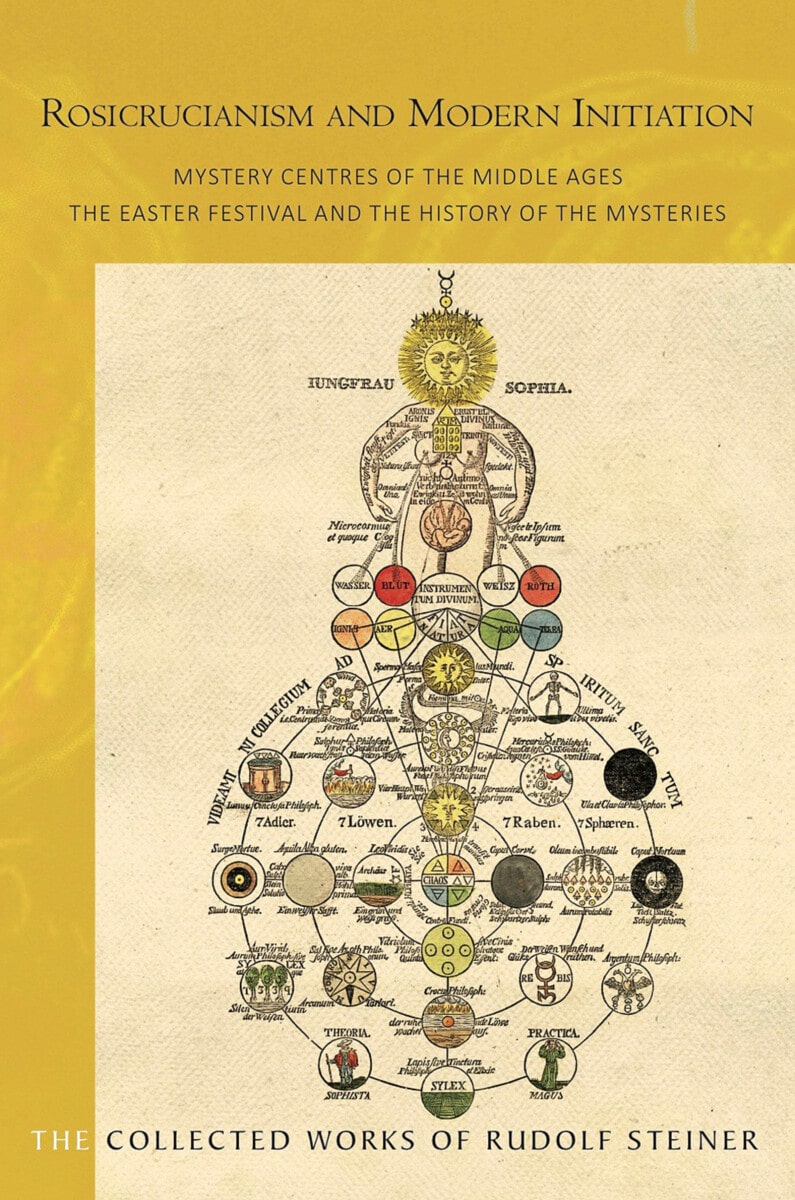Rosicrucianism and Modern Initiation: Mystery Centres of the Middle Ages: The Easter Festival and the History of the Mysteries
10 lectures in Dornach, Switzerland, January 4–13 and April 19–22, 1924 (CW 233a)
“Steiner has been able to clarify the historical reality behind the Rosicrucian story, with all its aura of glamor and fantasy. That effected, he points to the enormity of its vision for the future evolution of ideas” (Dr Andrew Welburn, from the introduction).
In the immediate aftermath of the “Mystery act” called the Christmas Foundation Conference, Rudolf Steiner chose to speak on the subjects of Rosicrucianism and modern initiation and the mystery centers of the Middle Ages. Clearly connected to the events that had just occurred in Dornach—in which he not only reestablished the Anthroposophical Society but also assumed a formal position within it—Steiner begins by exploring the intellectual life of the Middle Ages and the role that the mysteries played within it. He illumines on the foundations of Rosicrucianism, its principles of initiation, and its inherent impulse for freedom. Steiner also discusses the secret teachings of the eighteenth and nineteenth centuries and the dawn of the age of Archangel Michael.
In the second series of lectures, “The Easter Festival and the History of the Mysteries,” Rudolf Steiner describes how the annual festivals developed from the mysteries themselves. He speaks of mysteries connected to spring and autumn, Adonis and Ephesus, and the significance of Sun and Moon. Throughout the volume Steiner discusses the roles of Alexander the Great and Aristotle in world history and the significance of Aristotle’s “Categories.”
Published for the first time as a single volume, this freshly revised text is complemented with an extensive introduction, “Rudolf Steiner and the Rosicrucians,” by Dr Andrew Welburn, detailed notes and appendices by Professor Frederick Amrine, and an index.
Appendices:
1. Representation
2. The Hierarchies
3. The Etheric and the Astral Bodies
4. Cosmic Evolution
5. Raymond Lull
6. Eurythmy
7. Amos Comenius
8. Ahriman and Lucifer
9. Emil Du Bois-Raymond
10. Eliphas Lévi
11. Ernst Haeckel
This volume is a translation from German of Mysterienstätten des Mittelalters: Rosenkreuzertum und modernes Einweihungsprinzip Das Osterfest als ein Stück Mysteriengeschichte der Menschheit (GA 233a).
About the Author
Rudolf Steiner (1861–1925) was born in the small village of Kraljevec, Austro-Hungarian Empire (now in Croatia), where he grew up (see right). As a young man, he lived in Weimar and Berlin, where he became a well-published scientific, literary, and philosophical scholar, known especially for his work with Goethe’s scientific writings. At the beginning of the twentieth century, he began to develop his early philosophical principles into an approach to systematic research into psychological and spiritual phenomena. Formally beginning his spiritual teaching career under the auspices of the Theosophical Society, Steiner came to use the term Anthroposophy (and spiritual science) for his philosophy, spiritual research, and findings. The influence of Steiner’s multifaceted genius has led to innovative and holistic approaches in medicine, various therapies, philosophy, religious renewal, Waldorf education, education for special needs, threefold economics, biodynamic agriculture, Goethean science, architecture, and the arts of drama, speech, and eurythmy. In 1924, Rudolf Steiner founded the General Anthroposophical Society, which today has branches throughout the world. He died in Dornach, Switzerland.
Andrew Welburn is a fellow of New College, Oxford. He has written, translated, and edited numerous books on spiritual science and early Christianity, including The Beginnings of Christianity: Essene Mystery, Gnostic Revelation and the Christian Vision (1991); Gnosis: The Mysteries and Christianity (1994); and Myth of the Nativity: The Virgin Birth Re-examined (2006).
Frederick Amrine is associate professor of German at the University of Michigan. He holds advanced degrees from Cambridge University and Harvard. His publications include Goethe and the Sciences: A Reappraisal, The Bildungsroman, and Literature and Science as Modes of Expression. He has translated several works by Rudolf Steiner.











Theresa C. (verified owner) –
Adam Feathers (verified owner) –